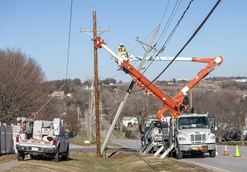
Storms frequently wreak havoc across the United States. Whether these storms come with lightning and thunder, snow and ice, or simply wind, they can all cause damage to electrical equipment, cutting off power for hours, days or weeks. There is a lot that goes into restoring power after such storms roll through your area. OPPD is the force behind bringing life back to normal – in our own service area and other communities across the country.
Not All Heroes Wear Capes
Following major storms that cause outages, OPPD is quick to mobilize crews. The task of restoring power is not an easy one. There are four main steps OPPD must take:
- Repair main lines from substations
- Isolate damage and prioritize repairs
- Repair lines that serve small groups of homes
- Work on individual service lines
This can be a big job on its own for lineworkers and transmission line crews, depending on the size of the outage. But OPPD is also in charge of clearing trees or limbs out of both intact and downed power lines. OPPD’s arborists and tree trimmers take on this dangerous but important job to keep customers safe. Crews must work carefully, always assuming downed power lines are live. Any limbs caught on intact power lines could result in more down wires. Power restoration relies on clearing off the debris so the crews must work quickly and move to the next problem area.
Crews work long, difficult hours following storms. Following a July 2021 storm, around 188,000 customers were left without power – the largest OPPD outage to date. OPPD staff and crews began to mobilize at 12:53 a.m. and worked around the clock through the next week to get power restored.
Following the “Father’s Day” tornado in 2017, over 76,000 customers were left without power. While this storm didn’t affect as many customers directly, it brought a different challenge. This storm didn’t just damage local power poles and lines – high-voltage transmission towers were also brought down. Crews worked tirelessly and had 86% of the power restored just two days later.
Winter storms have also caused problems for OPPD customers. In late October 1997, a surprise snowstorm dumped around 13 inches of wet snow on trees that still had most of their leaves, causing many trees and branches to fall rapidly in the early hours of the morning. It was estimated that nearly 75% of OPPD’s service area was affected by power outages. At one point, 130 of the 350 primary circuits in OPPD’s system were without power. Both line and tree crews worked 16-hour days in cold temperatures and high winds.
 Learn More!
Learn More!
The Give & Take of Mutual Aid
Story of a Storm Restoration
Tree Clean-Up After Storms
Storm Restoration FAQs
Outages Information
Lending a Hand to Power the Country
Massive storms that cause widespread power outages happen all over the country. Sometimes outage numbers and infrastructure damage is too much for local utilities to handle on their own, so outside help is a must. When the call goes out after a natural disaster, our crews answer and participate in mutual aid operations all over the country. Mutual aid is an agreement between utility companies to lend a hand following disasters and widespread outages. A typical mutual aid trip involves working on isolated outages, like individual homes, while the local utility handles the overall operations of the larger outage.
OPPD shipped out to aid in power restoration following Hurricane Katrina in the gulf area in 2005 and Hurricane Sandy on the east coast in 2012. More recently, crews have been called up to help after Hurricanes Irma, Ida, Ian and Idalia in the Florida. OPPD crews have also traveled to Kansas City, Minneapolis and other communities in Nebraska.
OPPD has had to call in visiting crews to provide mutual aid for our customers as well. Following the June 2017 tornado and the July 2021 storm, crews answered OPPD’s request for help from other parts of Nebraska, Iowa, Colorado and even Alabama.
OPPD belongs to multiple mutual aid groups, including the Midwest Mutual Assistance Group, Public Power Mutual Aid Network, Edison Electric and Nebraska Mutual Aid. Traveling crews also include a safety rep. As our crews work on systems they aren’t used to, they need an extra set of eyes to watch for any unanticipated risks to the crew. When mutual aid is needed, the host utility pays the crews who respond to their call and finds them lodging.
Storms come through the Midwest with a wide variation in strength and fury, and OPPD is always prepared to restore power to our customers as quickly and safely as possible. It doesn’t matter what time of year, or what type of storm, you can count on OPPD and other utilities through mutual aid to help us keep the lights on. Check out the links under Learn More! and our other related articles and resources for more information about storm restoration and mutual aid. And, the next time a big storm rolls through the area, step back and appreciate all the work that goes into turning on the lights.
Other Related Articles and Resources
How Does That Work? Mutual Aid
October 97 Storm Made OPPD Stronger
June 2017 Storm Showcased Mutual Aid Spirit
Damage from 2017 Storm Required Extensive Restoration Effort
Storm Recovery: Rebuilt and More Resilient
Communicator Recounts 97 Snowstorm Impacts
Challenges of Hurricane Idalia
Mutual Aid Team Returns from Florida
Mutual Aid Crews Return to Nebraska

